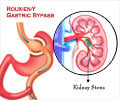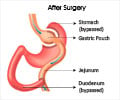It has emerged that an increasing number of obese adolescents, particularly females, are undergoing gastric bypass surgery.

Neural tube defects in the brain and spinal cord can be due to nutritional deficiencies. The report, "Neural Tube Defects: An Unforseen Consequence of Gastric Bypass Surgery in Young Female Patients?" reviewed the case of a young patient who had undergone gastric bypass surgery prior to becoming pregnant. She presented to the Fetal Treatment Center at UCSF Benioff Children's Hospital to discuss the possibility of fetal surgery as her fetus had spina bifida. A literature review found six additional documented cases of children born with neural tube defects thought to be due to maternal nutritional deficiencies, particularly malabsorption (when the body cannot absorb nutrients), following bypass surgery.
It is well documented that gastric bypass surgery leads to malabsorption causing multiple nutritional deficiencies, including folate (folic acid), which is a key element in the prevention of neural tube defects. Although daily folate replacement can reverse this deficiency, adolescents often don't comply with medication regimens.
This situation is especially critical because adolescents who have undergone gastric bypass surgery are at an increased risk of unintended pregnancies.
"We postulate that the malabsorption of folate, poor compliance with nutritional supplements and a higher risk of unintended pregnancies places young women at an increased risk for pregnancies complicated with neural tube defects," said senior study author Diana L. Farmer, MD.
"Although obesity is epidemic in this country, we believe non-reversible gastric bypass surgery should be avoided in adolescent women given the potential increased risk of fetal neural tube defects," Farmer said. "If gastric bypass is performed on an adolescent female, great efforts must be made to minimize the risks of both unintended pregnancies and nutritional deficiencies. This should include extensive pre-surgery counseling and frequent post-operative follow-up, as well as consideration of highly efficacious contraceptives such as an intra-uterine device."
Advertisement
Source-Eurekalert















